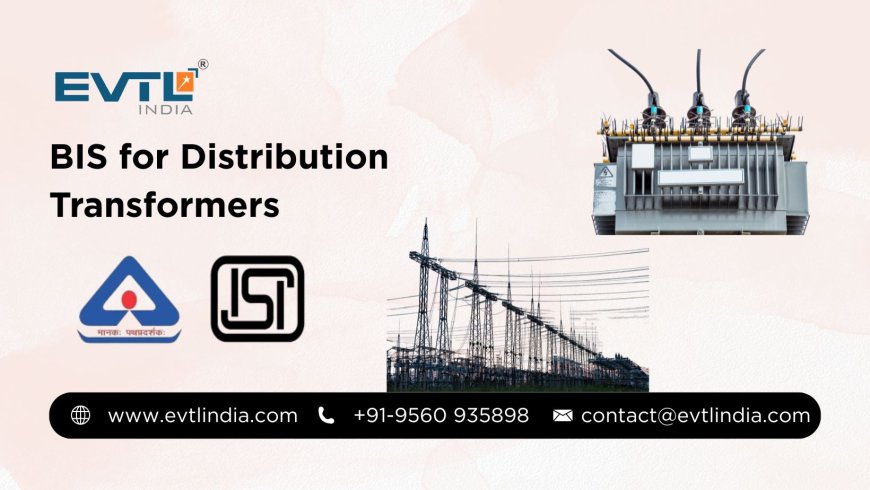A Complete Guide to BIS for Distribution Transformers

India's growing power infrastructure depends significantly on the reliability of transformers. Among these, distribution transformers play a critical role in ensuring the last-mile delivery of electricity to homes, businesses, and industries. However, ensuring the safety, quality, and efficiency of these transformers is not just about technical specifications it's also about complying with national standards. Thats where the BIS for Distribution Transformers comes into play.
In this blog, well explore everything you need to know about BIS certification for liquid-immersed distribution transformers, the ISI mark, and the role of consultants in achieving compliance.
Understanding Distribution Transformers
Distribution transformers are electrical devices used to step down voltage for distribution to residential or commercial customers. These are usually installed near consumer premises and operate continuously, making their reliability crucial.
There are mainly two types of distribution transformers:
-
Dry-type transformers
-
Liquid-immersed transformers
This blog focuses on liquid-immersed distribution transformers, which are filled with insulating oil to help with cooling and insulation.
What is BIS Certification?
BIS stands for the Bureau of Indian Standards, the national standards body of India. It operates under the Ministry of Consumer Affairs, Food & Public Distribution. BIS certification is mandatory for many products in India to ensure safety, performance, and quality.
The certification indicates that the product complies with the relevant Indian Standard (IS), as set by the Bureau.
Why is BIS Certification Mandatory for Transformers?
Transformers are vital components of the power distribution system. If not manufactured to quality standards, they can cause power losses, fire hazards, or even electrical failures. To avoid such issues, the Indian government, through the Bureau of Indian Standards, has made it mandatory for liquid-immersed distribution transformers to be certified before they are sold or used in the country.
BIS Certification for Liquid Immersed Distribution Transformers: Scope and Standard
The BIS certification for Liquid Immersed Distribution Transformers falls under IS 1180 (Part 1): 2014. This standard outlines the general requirements for outdoor-type oil-immersed distribution transformers up to and including 2500 kVA, with voltage not exceeding 33 kV.
The scope of this certification includes:
-
Transformer designs (star/delta)
-
Voltage class ratings
-
Energy efficiency levels
-
Testing procedures
-
Labelling and marking
Manufacturers must strictly adhere to the norms to qualify for the ISI mark.
What is the ISI Mark?
The ISI Mark for Liquid Immersed Distribution Transformers is a symbol of quality and safety issued by BIS. It signifies that the product conforms to a specific Indian Standard (IS).
The ISI mark not only builds trust with consumers but is also a legal requirement for products under the mandatory certification scheme. For transformers, the ISI mark ensures:
-
Energy efficiency
-
Long operational life
-
Low maintenance needs
-
Resistance to environmental stress
The absence of an ISI mark may lead to rejection in public tenders or even legal penalties for the manufacturer.
Steps to Obtain BIS Certification for Liquid-Immersed Transformers
-
Application Submission: The manufacturer submits the application to BIS along with product details.
-
Product Testing: Samples are tested in a BIS-recognized lab for safety, performance, and conformity.
-
Factory Inspection: BIS officers inspect the manufacturing facility for quality control procedures.
-
Grant of License: Once compliance is verified, a BIS license is granted.
-
ISI Mark Usage: The manufacturer can now affix the ISI mark on the certified transformers.
Documents Required for BIS Certification
Manufacturers need to submit the following documents:
-
Product drawings and specifications
-
Test reports from recognized labs
-
Factory layout and process flow chart
-
Quality control manual
-
Details of raw materials and suppliers
-
Previous certifications, if any
Incomplete or incorrect documentation can delay the approval process.
Role of a BIS Consultant
Applying for BIS certification can be a time-consuming and technically challenging process. From document preparation to coordinating with laboratories and handling inspections, each step requires expertise.
Thats where a BIS Cosultant for Liquid Immersed Distribution Transformers becomes essential. A professional consultant can help you:
-
Understand applicable standards and QCOs (Quality Control Orders)
-
Prepare all necessary documents correctly
-
Liaise with BIS officials and testing labs
-
Speed up the approval process
-
Minimize the risk of rejection
With a knowledgeable consultant, manufacturers can achieve certification faster and more efficiently.
Benefits of Hiring an ISI Consultant
An ISI Consultant for Liquid Immersed Distribution Transformers offers specialized services that can significantly ease the certification process. These experts have prior experience working with BIS regulations and can anticipate potential issues.
Some of the major advantages include:
-
Faster turnaround time
-
Expert guidance on testing procedures
-
Help with corrective actions if the sample fails
-
Compliance with latest BIS updates
-
Cost-effective solutions
For manufacturers new to BIS or those planning to export to India, hiring an ISI consultant can be a game-changer.
Common Challenges Faced by Manufacturers
While the certification process is straightforward in theory, manufacturers often face practical hurdles:
-
Delays in sample testing due to backlogs at labs
-
Errors in documentation or labelling
-
Confusion about standard updates or changes in BIS policy
-
Lack of clarity about applicable IS standards
Such issues can be avoided with proper planning and the assistance of a professional BIS consultant.
How to Choose the Right BIS Consultant?
Not all consultants offer the same level of service. When choosing a BIS or ISI consultant, consider the following:
-
Years of experience
-
Specialization in electrical equipment
-
Track record of successful certifications
-
Understanding of both domestic and international compliance norms
-
Client reviews or testimonials
You may also want to look for consultants who offer end-to-end support from pre-application assessment to post-approval monitoring.
Government Initiatives and QCOs
The Government of India frequently updates the Quality Control Orders to include new categories under mandatory BIS certification. For transformers, several QCOs have been issued in recent years making BIS certification legally binding for manufacturers.
Staying up-to-date with these notifications is crucial. Failure to comply can result in heavy penalties or even a ban on manufacturing or selling.
Final Thoughts
EVTL India is one of the leading BIS Consultant in India, helping manufacturers obtain their BIS licences hassle-free. In todays regulatory landscape, ensuring compliance is not optional it's a necessity. The BIS certification for liquid-immersed distribution transformers ensures that products meet the required safety, quality, and energy efficiency benchmarks.
Whether you're a manufacturer planning to enter the Indian market or an existing producer aiming to expand operations, understanding the BIS process is crucial. Partnering with a skilled BIS or ISI consultant can save you time, money, and effort, while boosting your credibility in the market.





































